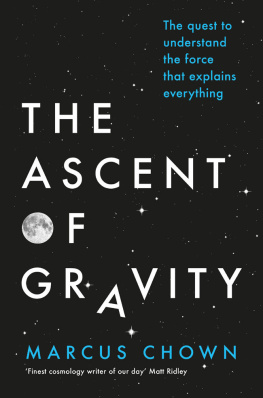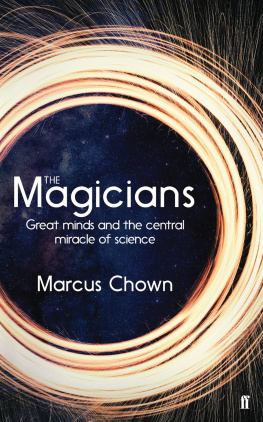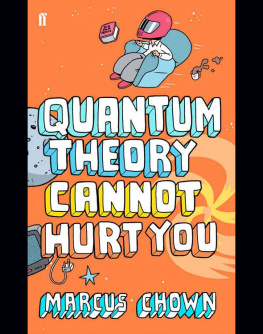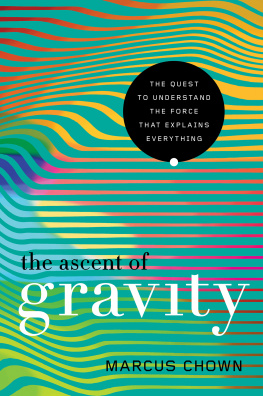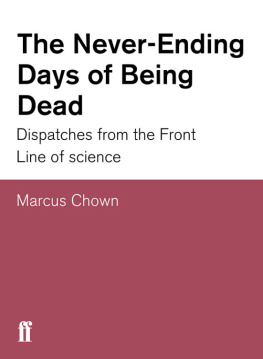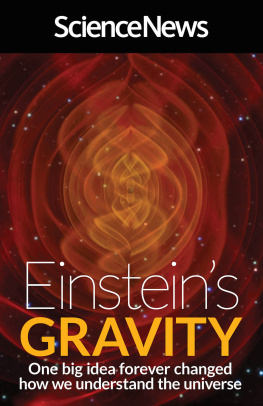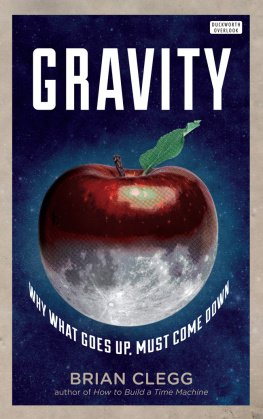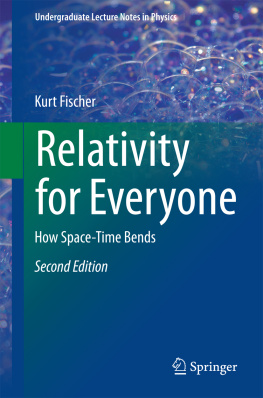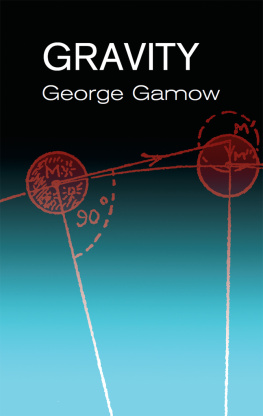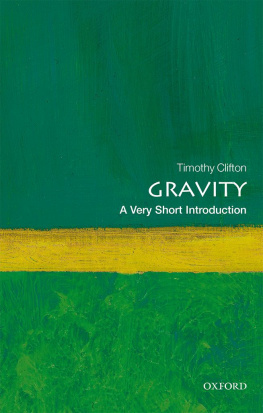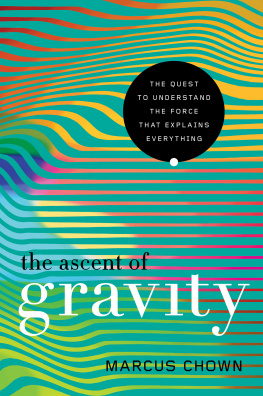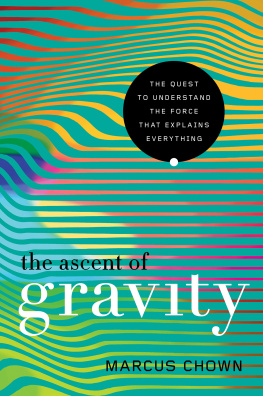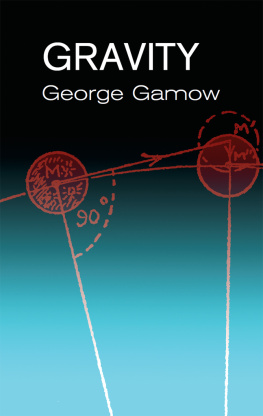THE ASCENT
OF GRAVITY
The quest to understand the force
that explains everything
MARCUS CHOWN

To Mike & Claire, Val & Pat, Maureen & Pete
With love, Marcus
Its embarrassing that were in the twenty-first century and we dont even know what makes gravity work.
Woody Norris
Contents
Six things you may not know about gravity
Gravity creates a force of attraction between you
and the coins in your pocket and between you and
a person passing you on the street
It is so weak that, if you hold your hand out,
the gravity of the whole Earth cannot overcome
the strength of your muscles
Despite its weakness, gravity is so irresistible on
the large scale that it controls the evolution and
fate of the entire Universe
Everyone thinks it sucks but in most of the
Universe it blows
If it had not switched on after the big bang
time would not have a direction
Only by figuring it out will we be able to
answer the biggest question of all:
Where did the Universe come from?
At Livingston in Louisiana and Hanford in Washington State there are 4-kilometre-long rulers made of laser light. At 05.51 Eastern Daylight Time on 14 September 2015, a shudder went through first the Livingston ruler, then 6.9 milliseconds later, the one at Hanford. It was the unmistakable calling card of a passing gravitational wave a ripple in the very fabric of space-time predicted to exist by Einstein almost exactly 100 years ago.
In a galaxy far, far away, at a time when the Earth hosted nothing bigger than a simple bacterium, two monster black holes, locked in a death-spiral, swung around each other one last time. As they kissed and coalesced, three whole solar masses vanished, reappearing instantly as a tsunami of a warped space-time, which raced outwards at the speed of light. For an instant its power was fifty times greater than that of all the stars in the Universe put together.
The detection of gravitational waves by the twin detectors of the Laser Interferometer Gravitational-Wave Observatory (LIGO) on 14 September 2015 was an epoch-making moment in the history of science. Imagine you have been deaf since birth, then, suddenly, overnight, you are able to hear. This is the way it is for physicists and astronomers. For all of history we have been able to see the Universe. Now, at last, we can hear it. Gravitational waves are the voice of space. It is not too much of an exaggeration to say that their detection is the most important development in astronomy since the invention of the telescope in 1608.
Gravitational waves confirm that space-time is a thing in its own right, which can quiver and shudder, sending undulations propagating outwards like ripples spreading on a pond. They are the ultimate proof of Einsteins contention that gravity is warped space-time. Whereas Newton imagined a force of gravity reaching out from the Sun and ensnaring the Earth like a piece of invisible elastic, Einstein recognised that the Sun creates a valley in space-time in its vicinity around which the Earth circles endlessly like a planet-sized roulette ball in an oversized roulette wheel.
Although Newtons theory of gravity was hugely successful, explaining the motion of the planets and the ocean tides and even predicting the existence of an unknown world Neptune Einsteins theory of gravity was just as successful, explaining the anomalous motion of Mercury and predicting the existence of black holes and the big bang in which the Universe was born. But Einsteins theory of gravity, like Newtons before it, contains the seeds of its own destruction. At the hearts of black holes and at the birth of the Universe, it predicts the existence of nonsensical singularities where the parameters of physics skyrocket to infinity.
The irony is that the first force to be described by science and the one everyone thinks was understood long ago is actually the least understood. Gravity, to steal the words of Winston Churchill, is a riddle, wrapped in a mystery, inside an enigma.
Now, at the outset of the twenty-first century, we stand on the verge of a new revolution. The search for a deeper theory than Einsteins a quantum theory of gravity is the greatest endeavour ever embarked upon by physics. Already, there are tantalising glimpses of a new world view. Perhaps another Newton or Einstein is at this moment waiting in the wings, assembling the fragmentary pieces of the puzzle into a coherent whole. Or perhaps a more likely scenario it will take the efforts of dozens of people working in concert. Many physicists believe we are on the verge of a seismic shift in our view of reality, one more far-reaching in its consequences than any that has gone before.
Will the deeper theory than Einsteins give us warp drives and time machines, the ability to manipulate space and access parallel universes? No one can predict, just as no one in the pre-electrical era could have predicted televisions and mobile phones and the World Wide Web. What we do know is that when at last we have the elusive theory in our possession, we will be able to answer the biggest scientific questions of all. What is space? What is time? What is the Universe? And where did it come from?
But I am getting ahead of myself. How did we get to where weare today, standing on the brink of a vast undiscovered landscape of physics? The story began with a twenty-two-year-old named Isaac Newton in the plague year of 1666
A word on endnotes, which readers will find after the final chapter of the book: some contain asides that, if included in the text, would have broken its flow. Some amplify the explanations in the text, occasionally using technical language. And some are references to books and articles, where you can find out more information about the subject in the text.
How Newton found the first universal law
one that applies in all places and at all times
For in those days I was in the prime of my age for invention and minded Mathematicks & Philosophy more than at any time since.
Isaac Newton
You fainted and I caught you. It was the first time Id supported a human. You had such heavy bones. I put myself between you and gravity. Impossible.
Elizabeth Knox, The Vintners Luck
So, Mr Newton, how did the idea of universal gravity come to you?
They are in the garden of Woolsthorpe Manor, half a century after the event: the elderly natural philosopher, now the most famous personage of his day, sitting across the table from William Stukeley, the young clergyman and archaeologist who has set himself the formidable task of writing the first biography of Isaac Newton. A stream burbles at the bottom of the garden and lambs bleat at random intervals in the field beyond. A raven lands on the lush orchard grass before them, pecks at nothing in particular and takes wing again.
The old man ponders the question, sweeps his long white hair back from his face, then says: Mr Stukeley, you see that tree yonder?
I do.
In the spring of 1666, on a warm day not unlike this, I was seated in this very spot, jotting in my notebook, when an apple fell from the tree
But great men are apt to concoct their own legends. The story of the apple was indeed told by Newton, close to the end of his life, in the garden of Woolsthorpe Manor, Linconshire. After dinner, the weather being warm, we went into the garden and drank tea, under the shade of some apple trees, wrote Stukeley in Memoirs of Sir Isaac Newtons Life, published in 1752. He told me, he was just in the same situation as when formerly the notion of gravitation came into his mind. It was occasiond by the fall of an apple, as he sat in contemplative mood. Why should that apple always descend perpendicularly to the ground, thought he to himself ?
Next page
